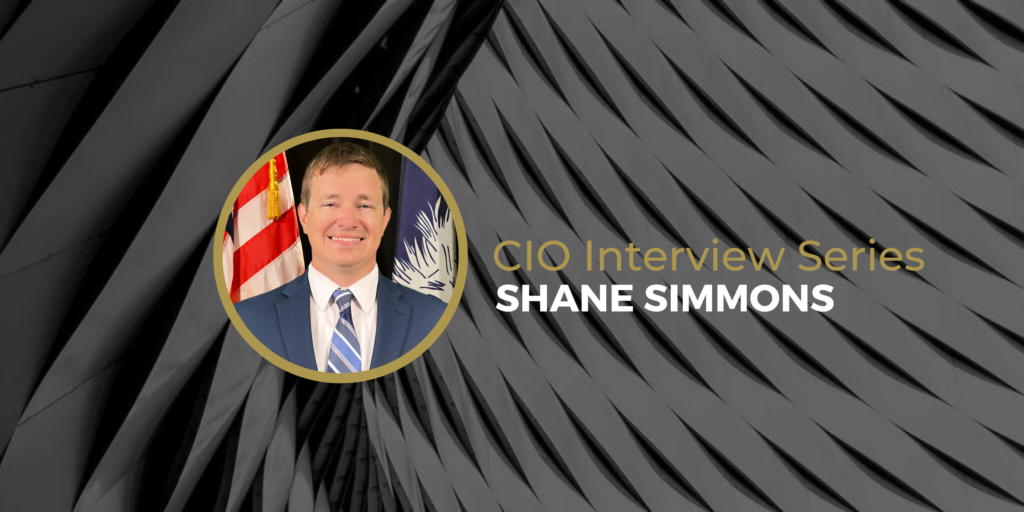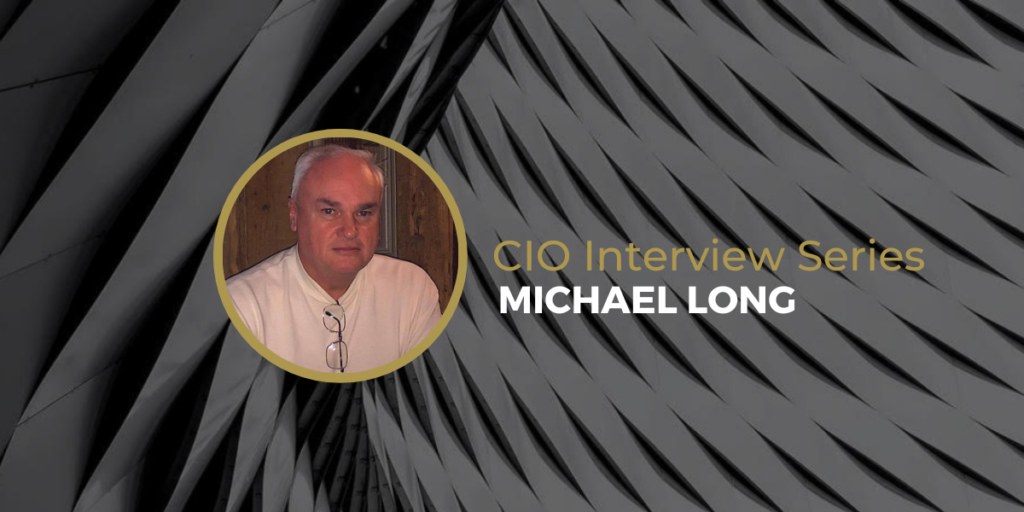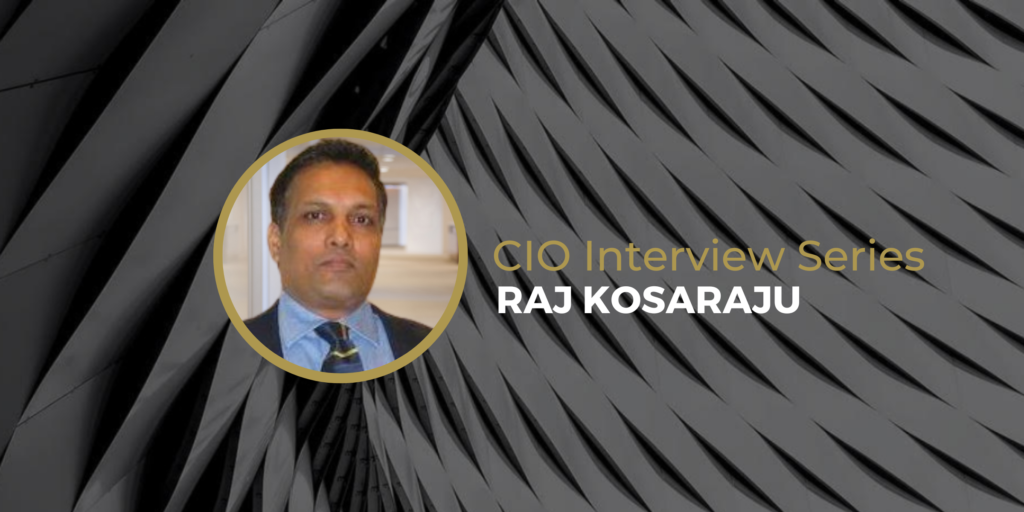Shane Simmons

CIO at South Carolina Department of Employment and Workforce
Can you please provide a little introduction about yourself
I currently live in the Upstate of South Carolina and serve the SC Department of Employment and Workforce as the Chief Information Officer. In this role, I oversee and execute the agency’s technology strategic vision and execution.
What has your journey to your position been like? What path have you taken?
I originally started working as a mechanic out of high school. Did that for years until I was married and had two daughters. I ended up joining the military, working in secure satellite communications. I always had an interest in technology and wanted to go back to school for it, but I never had time. I ended up getting deployed one year, and while downrange, I got to go to Signal University in Kuwait on 3 separate occasions. I attended 3 different classes: Security+, Ethical Hacking, and Network+. I ended up getting all three certifications in a two-month span. That really motivated me to make the career switch to technology when I got home from deployment. Even with my experience and certifications, it was hard getting my first civilian IT job. I was fortunate that a soldier in my unit worked in the helpdesk at an organization and talked his manager into hiring me. My goal was cybersecurity, but since I had no luck, I took the helpdesk job. A couple of months later, I enrolled in Western Governors University for their bachelor’s in cybersecurity and information assurance. Not long after that, I got a job offer as a network engineer. The job paid more but required me to move my family from one side of the state to the other. While working at that job, I knocked out a lot of my classes at WGU, including 52 semester hours in one 6 month term. Some of those classes allowed me to get more certifications under my belt as well. I ended up applying for the top cybersecurity position at an organization and actually got it. I was finally where I wanted to be and was making pretty decent money. Life seemed perfect at the time between work and home. I ended up applying for a State agency’s executive cybersecurity job, the Chief Information Security Officer (CISO). It came down to me and one other guy, which I ended up not getting. At the time, I had worked my way up through helpdesk, networking, and cybersecurity and had 12 or 13 IT/IT Security certifications. I was crushed. It’s always hard hearing you are not good enough. About 6 months later, I saw another posting for a State agency’s CISO position and tried again. It ended up coming down to me and 2 other guys for this position, and I was actually chosen. This was a huge milestone financially because it was the first time I had ever hit the 6 figure mark. Growing up, kids dream about that number but never thought I’d make that kind of money to support my family. Having that position is what changed my technology career. I had so many issues ranging from technology questions, security incident handling, and scoping out vendors to proofreading legal documents. I thought I was good at excel before this job but I became a master at excel while here! Being the CISO at that agency allowed me to network and meet some really great and talented individuals, all while really developing my skills. After a couple of years in this role, I realized I was slacking and had not set any new goals for myself in a while. I was making great money and reached the pinnacle executive title for the cybersecurity field. I knew cyber inside and out, and it was no longer challenging for me. When I saw the posting for DEW’s Chief Information Officer (CIO) role, I gave it a shot. I ended up being selected and this has been the most fun and challenging experience of my professional career. This challenge continues to motivate me to do more not just for me, but for other people. Doing what I can to help others get into IT or security and build their career. The only thing I know that the future holds now is that sometime in 2023, I’ll be going back to school again to pursue my MBA.
Has it always been your vision to reach the position you’re at? Was your current role part of your vision to become a tech leader?
I never had the goal of being in my current position. I always wanted to be a Chief Information Security Officer (CISO) and I have achieved that at two different organizations. In that time, I had already made a name for myself in the cyber world in South Carolina, completed huge security projects that really improved those organizations, and enabled those organizations to become compliant with several regulatory bodies. My current role came about as the next challenge to undertake to not be complacent. Little did I know I would enjoy the challenges that get thrown at me every day as a strategic leader.
Have you had a role model or mentor that has helped you on your journey?
I’ve had two people that have really helped me in my career as I’ve developed. The first would be Tony Hamrick. Tony was my instructor overseas for my Certified in Ethical Hacking class. He’s always been someone I could call when I was stuck and always gave sound advice, whether it was something I wanted to hear or not. The second would be Jose Encarnacion, who was my Chief Information Officer at a previous job. I really learned a lot from Jose about balancing technology with the business, empowering the business to be successful, and how to communicate as a professional. Jose ended up being my inspiration for considering applying to DEW’s CIO role. Even after accepting the role, I’ve maintained contact with Jose. He’s truly a great mentor.
How do you see the role of the technology leader evolving over the next 5 years?
As a CIO, I have have to have both technical skills, business acumen, and project management skills. I think this role is completely different that it was in the past. In the past, the promotion path was working as developers and moving your way up into this role. For the CISO role, coming up the security ranks as a technical analyst to engineer. We are already seeing trends where these tops spots are not super technical any more. Business acumen, risk centric, project management, and strategic thinking are required skills at this level now. Over the next 5 years I see these roles becoming even less technical and even requiring them to have an MBA as an entry point. Technology not only enables a business, but most of the time IS the business. So, these roles require understanding business and finances to be successful.
What skills do you think leaders of the future will need in order to thrive?
Don’t let your technical capabilities slip. Still need to stay up to date on not only new and emerging technologies, but old ones as well. That’s because you may start working for an organization that utilizes legacy technology to you are going to have to modernize. Outside of technology, you have to understand business, finance, and project management. Personality is also a contributing factor to thrive. Someone that can cultivate mutually productive relationships and build teams.
How do you keep current with new skills, technologies and personal development?
I do a lot of reading (books, magazines, blogs) as well as podcast. I spend a lot of time of the road going to work every day with makes podcast my favorite thing at this time.
What do you see as the next leap in technology that will impact your business or industry in particular?
Artificial Intelligence (AI) combined with robotic processing automation (RPA) is going to be a huge thing that impacts my industry. With the advancements in AI inbound, a combination of AI and RPA is going to allow the business to automate a lot of mundane tasks that will allow employees to be more productive in other areas, which is overall better for the business. The advancements in data modeling continue to improve, so a combination of quantum computing power combined with big data will allow my industry to move more to a data-driven organization. Imagine having data-driven decision-making at every process level throughout your organization. Refining and improving processes to be as efficient as they can would be a game changer.
“Make friendships. Build relationships. Those relationships are what will make your career successful.”
If you were mentoring a leader of the future, what advice or guidance would you give to help them on their way?
Network. Today’s future leaders must understand the importance of networking with other people. Make friendships. Build relationships. Those relationships are what will make your career successful. Always have goals and don’t become stagnant. Once you do make it and you are successful, make sure you start reaching out to others to help and guide them.
Is there anything in particular that you would still like to achieve in your career or what is the next step on your journey?
The next immediate task for me is enrolling back in school and completing my MBA. I don’t know in the technology field if there is really a next “hurdle” for me. After I get my MBA, I think it would be another career change and trying to get a Chief Operating Officer (COO) role. Having someone with my experience in that role bakes security into processes and utilizes technology to improve processes, all of which can make a good COO very dynamic and successful.
If you could change one thing in the world, what would it be?
The gates for training to get into high-demand fields. Everyone can’t afford to get the training they need to break into a career they love or have a passion for, so they are stuck in a miserable career field.
A big thank you to Shane Simmons from South Carolina Department of Employment and Workforce for sharing his journey to date.






